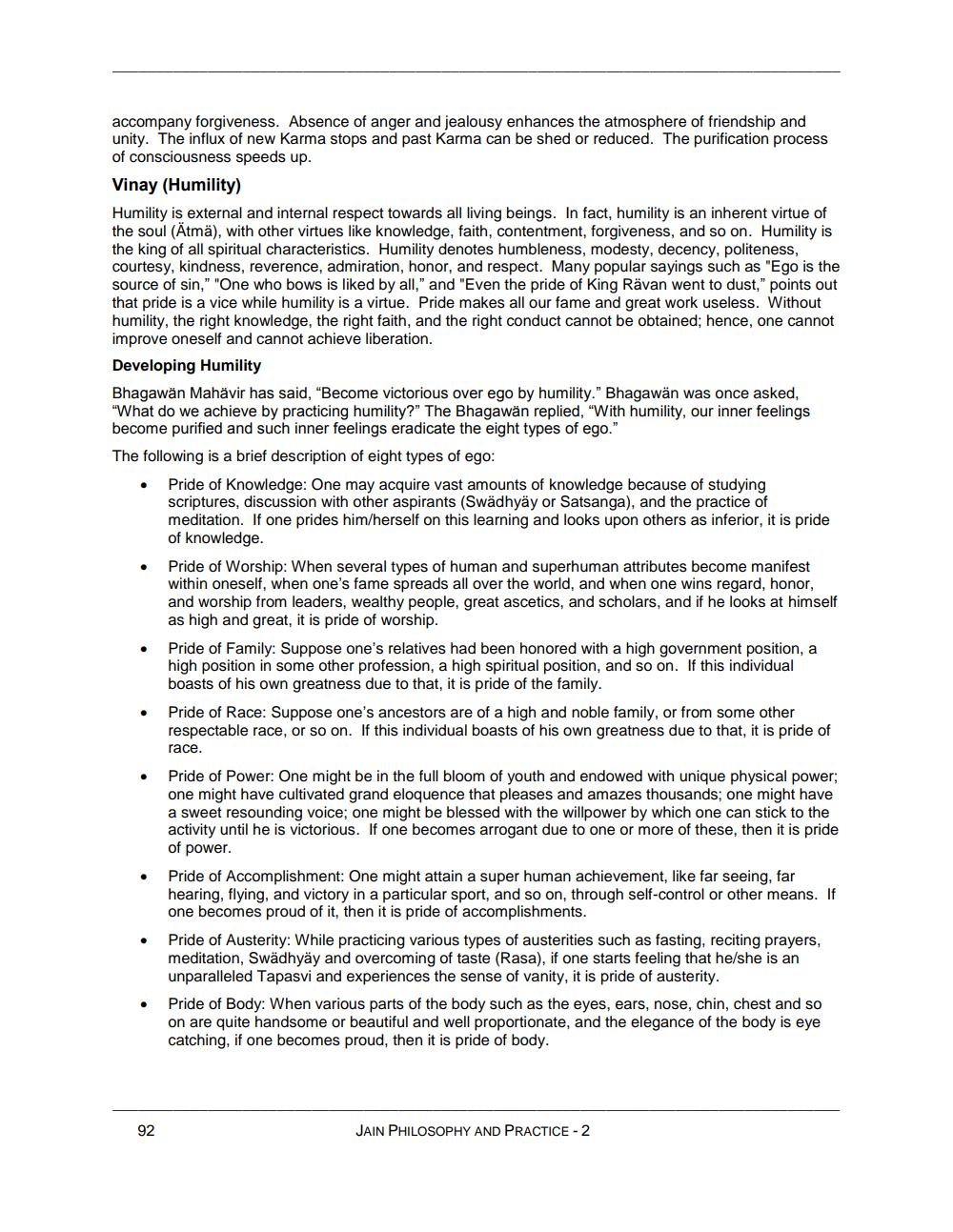________________
accompany forgiveness. Absence of anger and jealousy enhances the atmosphere of friendship and unity. The influx of new Karma stops and past Karma can be shed or reduced. The purification process of consciousness speeds up.
Vinay (Humility)
Humility is external and internal respect towards all living beings. In fact, humility is an inherent virtue of the soul (Ätmä), with other virtues like knowledge, faith, contentment, forgiveness, and so on. Humility is the king of all spiritual characteristics. Humility denotes humbleness, modesty, decency, politeness, courtesy, kindness, reverence, admiration, honor, and respect. Many popular sayings such as "Ego is the source of sin," "One who bows is liked by all," and "Even the pride of King Rävan went to dust," points out that pride is a vice while humility is a virtue. Pride makes all our fame and great work useless. Without humility, the right knowledge, the right faith, and the right conduct cannot be obtained; hence, one cannot improve oneself and cannot achieve liberation.
Developing Humility
Bhagawan Mahavir has said, "Become victorious over ego by humility." Bhagawan was once asked, "What do we achieve by practicing humility?" The Bhagawän replied, "With humility, our inner feelings become purified and such inner feelings eradicate the eight types of ego."
The following is a brief description of eight types of ego:
• Pride of Knowledge: One may acquire vast amounts of knowledge because of studying scriptures, discussion with other aspirants (Swädhyäy or Satsanga), and the practice of meditation. If one prides him/herself on this learning and looks upon others as inferior, it is pride of knowledge.
92
Pride of Worship: When several types of human and superhuman attributes become manifest within oneself, when one's fame spreads all over the world, and when one wins regard, honor, and worship from leaders, wealthy people, great ascetics, and scholars, and if he looks at himself as high and great, it is pride of worship.
Pride of Family: Suppose one's relatives had been honored with a high government position, a high position in some other profession, a high spiritual position, and so on. If this individual boasts of his own greatness due to that, it is pride of the family.
Pride of Race: Suppose one's ancestors are of a high and noble family, or from some other respectable race, or so on. If this individual boasts of his own greatness due to that, it is pride of
race.
Pride of Power: One might be in the full bloom of youth and endowed with unique physical power; one might have cultivated grand eloquence that pleases and amazes thousands; one might have a sweet resounding voice; one might be blessed with the willpower by which one can stick to the activity until he is victorious. If one becomes arrogant due to one or more of these, then it is pride of power.
Pride of Accomplishment: One might attain a super human achievement, like far seeing, far hearing, flying, and victory in a particular sport, and so on, through self-control or other means. If one becomes proud of it, then it is pride of accomplishments.
Pride of Austerity: While practicing various types of austerities such as fasting, reciting prayers, meditation, Swädhyäy and overcoming of taste (Rasa), if one starts feeling that he/she is an unparalleled Tapasvi and experiences the sense of vanity, it is pride of austerity.
Pride of Body: When various parts of the body such as the eyes, ears, nose, chin, chest and so on are quite handsome or beautiful and well proportionate, and the elegance of the body is eye catching, if one becomes proud, then it is pride of body.
JAIN PHILOSOPHY AND PRACTICE - 2




